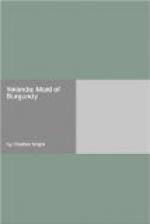“Yes—yes, to-morrow evening,” said the burgher, hesitatingly.
Max accepted the invitation and we made our adieux.
At the bridge over the Cologne we met Hymbercourt returning to his house from the castle. While we talked, the cavalcade of ladies and gentlemen that we had watched from Castleman’s garden cantered up the street.
“You will now see the princess,” said Hymbercourt. “She comes with the duke and the duchess. They left the castle at five, and have been riding in the moonlight.”
We stepped to one side of the street as the cavalcade passed, and I asked Hymbercourt to point out the princess.
“She rides between the duke—the tall figure that you may recognize by his long beard—and the page carrying a hooded falcon,” he answered.
Surely this evidence should have put my mind at rest concerning my hallucination that Yolanda was Mary of Burgundy; but when we reached the inn and Max told me of his conversation with Yolanda the riddle again sprang up like a jack-in-the-box. I felt that I was growing weak in mind. Yolanda’s desire to tell Max her secret, and her refusal; her longing for human sympathy, and the lack of it; her wish that he should remain in Peronne for a month—all these made me feel that she was the princess.
I could not help hoping that Hymbercourt was mistaken in pointing out Her Highness. She rode in the shadow of the buildings and the moon was less than half full. Yolanda might have wished to deceive us by pointing out the princess while we watched the cavalcade from Castleman’s garden. The burgher and Twonette might have been drawn into the plot against us by the impetuous will of this saucy little witch. Many things, I imagined, had happened which would have appeared absurd to a sane man—but I was not sane. I wished to believe that Yolanda was the princess, and I could not get the notion out of my head.
Yolanda’s forwardness with Max, if she were Mary of Burgundy, could easily be explained on the ground that she was a princess, and was entitled to speak her mind. I was sure she was a modest girl, therefore, if she were of lowly birth, she would have hesitated to speak so plainly to Max. So, despite overwhelming evidence to the contrary, I refused to be convinced that Yolanda was not Mademoiselle de Burgundy. I loved the thought so dearly that I could not and would not part with it. That night, while I lay pondering over the riddle, I determined to do no more guessing, and let the Fates solve it for me. They might give me the answer soon if I would “give it up.”
The next evening we went to Castleman’s house, but we did not see Yolanda. Frau Kate said she was indisposed, and we ate supper without her. It was a dull meal,—so much does a good appetite wait upon good company,—and for the first time I realized fully the marvellous quality of this girl’s magic spell. Max, of course, was disappointed, and we walked back to The Mitre in silence.




